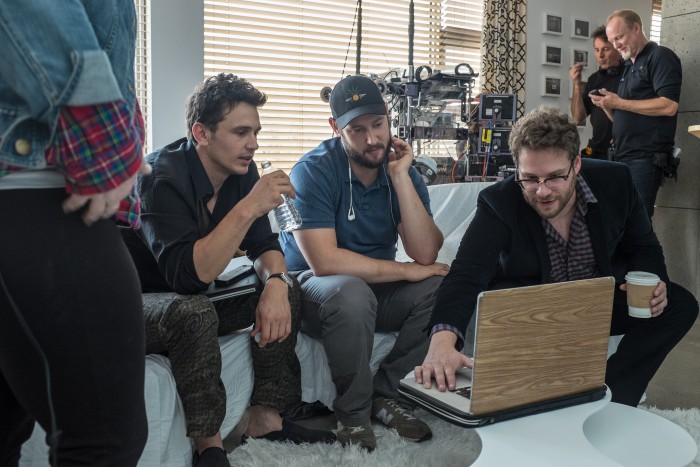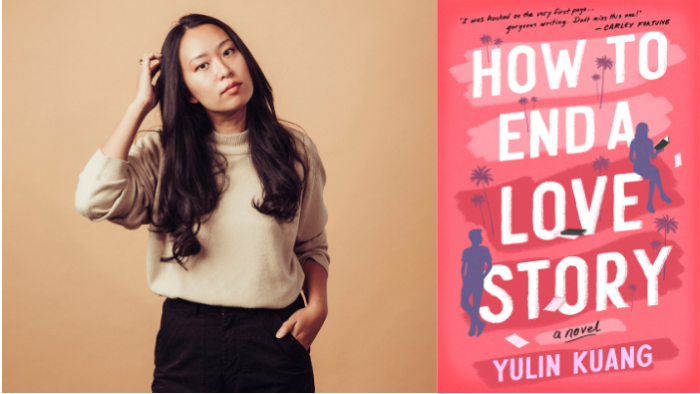Last month, KoreAm spoke with actor Seth Rogen before the Sony cyberattack grew to its current dimensions.
by ADA TSENG | @adatseng
ada@charactermedia.com
In late November, before full details of the Sony hack were revealed, Ada Tseng, a freelance writer for KoreAm, spoke by phone with actor Seth Rogen for the magazine’s upcoming cover story on his co-star Randall Park, who plays dictator Kim Jong-un in the political satire, The Interview.
Rogen is co-director, co-producer and co-writer of the controversial film (in which he stars opposite James Franco), which involves an assassination plot against the North Korean leader.
Right after KoreAm spoke with Rogen, it was revealed that the computer systems at Sony Pictures, the studio that backed The Interview, fell victim to an invasive cyberattack by a group calling itself “Guardians of Peace,” whose affiliations to any group, entity or nation remain unknown. Sony senior executives have seen their private emails leaked to the public, while sensitive data and the studio’s unreleased films have been compromised.
The North Korean government has called The Interview “an act of war” and has threatened “merciless” retaliation against the United States if the movie is released as scheduled on Christmas Day.
The controversy over the film has only ratcheted up in the last 48 hours, with the unidentified hackers making threats against theaters that planned to screen the film.
As of Wednesday morning, one major theater chain, Carmike Cinemas, pulled the film from its theaters while a scheduled New York premiere of the film Thursday evening was abruptly canceled. KoreAm‘s advanced screening slated for tonight, in partnership with Sony, was also called off Wednesday afternoon, followed by the studio’s announcement that it was canceling the film’s Dec. 25 release date, after a majority of distributors said they would not The Interview.
Whether or not the cyberattack is direct “retaliation” against the film and its brazen plotline—or just a cover-up for hackers operating independent of the geopolitical undercurrent—is unclear.
The following is an edited conversation Tseng had with Rogen last month about the producers’ idea for the film, research for authenticity and the casting of Park as Kim Jong-un. KoreAm’s December/January issue, available later this month, will feature Park on the cover.
Why did you choose North Korea as a setting for the film?
Seth Rogen: I think we were just really fascinated with North Korea. It really captured our imagination. Then we started reading more, and the more we read about it, the weirder it was. The stranger, more bizarre facts we uncovered, it fed the fire more and more. Meanwhile, we thought it’d be fun to make a movie about a journalist who’s asked to assassinate the person he’s interviewing, so we kind of combined the ideas.
I heard that the idea came way before Dennis Rodman visited Kim Jong-un in 2013. What did you think when Rodman went to North Korea? Did that help the script in any way?
Yes, our biggest concern was that the script was very far-fetched, [yet] everything we read about [Kim Jong-un] suggested he might do something like that. He loves Western culture, and as a person, he seemed to portray the image that he didn’t take himself too seriously. He was laughing in a lot of the pictures you saw of him. He still is a horrible dictator obviously, but we thought that comedically, it might be interesting if you met him and you kind of liked him. And we were like, “No one will believe us,” and then that was a concern, because the whole thing seemed so ridiculous. But then Dennis Rodman went [to North Korea] and liked the guy! We were like, “Wow, it’s exactly what we wrote, and it came true,” and if anything, it lent credibility to the movie in a way we never expected.
Did you always envision the script featuring Kim Jong-un?
When we originally wrote the script, it was [Kim Jong un’s father and previous North Korean dictator] Kim Jong-il, but then he died. When he died, we re-wrote it with Kim Jong-un.
Doesn’t that work better with the plot?
Exactly. We know less about [Kim Jong-un], and he’s younger and closer to our age.
And the film’s characters can socialize with him …
Exactly. That was the one weird part [in the original version]: Franco partying with a 70-year-old man. So when we re-wrote it with Kim Jong-un, it opened [the script] up a lot, so you believe they’d bond over more things pop culturally. Maybe they’d like the same music and movies.
What did Randall Park bring to the role of Kim Jong-un?
When we wrote [his character], it was a little more formal than how he acted. It was less adorable, for lack of a better world [laughs]. Randall really added a lot of that. As soon as he came into the room and auditioned—we read the scene where he’s at the door [meeting Franco’s character] for the first time, and says, “Hello Dave,” and he’s really shy—that, to us, was just really funny.
It seems like there’d be a difficult balance to strike with that character.
It was a conversation we had a lot and a line we were very careful with. We want to push the audience to a place where we’re like, “I can’t believe it, but I like this guy!” and then have them come back from that. It’s almost as though they’re being seduced [by Kim Jong-un] in the same way that Franco is in the movie.
Is it true that you auditioned Randall in every single scene?
Yes, we read the entire script. I think we said, “If it seems like it’s going well, we’ll keep going,” and then it seemed like it was going well.
Did you have anyone else in mind when you wrote the character?
There was no one else. So, I’m so thankful that Randall did it so well. We didn’t know for sure if it would work, to be honest.
I’m wondering about some of the North Korean scenes, in particular the one that shows kids playing instruments. Where did you get that idea from? A documentary?
That’s exactly where it’s from. Almost everything that is in North Korea that happens to [the characters once they arrive] is based on something we read. The fake grocery stores, the mountain fortress, these guitar kids trained from a young age to be proficient with giant guitars. All the facts about Kim Jong-un are based on real stuff we found.
But what’s funny about the guitar kids—there’s a documentary about North Korea that shows North Korean kids with creepy plastic looks on their faces playing the guitar, and we were like, ‘Let’s find kids that are really good at playing guitar like those kids!’ And what we found was, no kids are good at playing the guitar like those kids! [Laughs.] Only if you live in a dictatorship where you’re forced to learn guitar from a young age are you able to be that good at guitar. So we had to fake it for the movie because no kids except the kids in North Korea are that good at guitar.
What kind of balance did you have to strike for the entire movie? It’s a comedy, but at the same time, these are real-life people in real-life situations.
It was hard. We wanted to make sure we villainized the regime, not the people in North Korea. It was a conversation we had a lot, that we really need to make that distinction—that North Koreans aren’t bad, the people who rule North Korea are bad.
The hardest part about that was to do it in a way that didn’t feel heavy-handed and overdramatic and that [fit] the tone of the movie. There were a lot of conversations, like “Does Dave find a [North Korean] death camp?” Ugh, that’d feel so heavy-handed. And we felt like fake grocery stores were the perfect metaphor for the illusion of what they present versus what’s real.
Also, me and Evan [Goldberg, the film’s co-producer and co-director,] grew up watching Seinfeld and The Simpsons, [which involve] stories that are somewhat existing in the same world as the viewer. To some degree, [those characters] are planting themselves in your world and tearing down the walls that generally separate movies from real life. That, to us, was generally exciting, so that’s why calling [the film’s antagonist] Kim Jong-un to us was an interesting idea. Because it made you, as a viewer, come into the movie with all your actual feelings about Kim Jong-un, and then what’s even more exciting to us is when we undercut and subvert those feelings and make you like him.
Can you discuss the film’s ending? (The Sony hack revealed that the original ending was a source of disagreement between Rogen and Sony’s top executives, who asked for it to be toned down).
My hope is that by the time you get to the end, it’s not “Kim Jong-un, the North Korean dictator,” it’s “Kim Jong-un, the guy in our movie.” We try to have our cake and eat it too, to some degree. [The film] is making fun of real life, but then it’s just trying to do what a good movie would do at that moment.
Photo courtesy of Sony Pictures.






